Leonid Berenshtein’s life story fascinated director Roman Shumunov from the moment he first learned about it. A Soviet Jew, born in Ukraine, Berenshtein became a legendary partisan commander during World War II.
In 1944, he located a factory in Dembica, Poland, that produced Hitler’s dreaded secret weapon, the V2 rocket. The factory was subsequently bombed by the Red Army, delivering a key blow to the Third Reich. Decades later, Berenshtein relocated to Israel.
The former battalion commander’s story is shared in Georgian-Israeli director Shumunov’s new eponymous docudrama film, “Berenshtein.”
“I was sitting with a man who was responsible for great, internationally significant things in the Second World War that changed the whole outcome of the war,” Shumunov told The Times of Israel about his interviews with the war hero, who died in 2019 at the age of 98.
He added, “When I met him, he was 95 years old. He lived in a very, very small apartment, one-and-a-half bedrooms. No one knew anything about him — in Israel, in his neighborhood, no one. It was a little bit crazy, it was very weird. When I met him, he started to tell his story.”
Get The Times of Israel's Daily Edition by email and never miss our top stories
Originally conceived as a documentary, the project switched to the docudrama genre and lasted about four years, challenging its director, cast and crew alike.
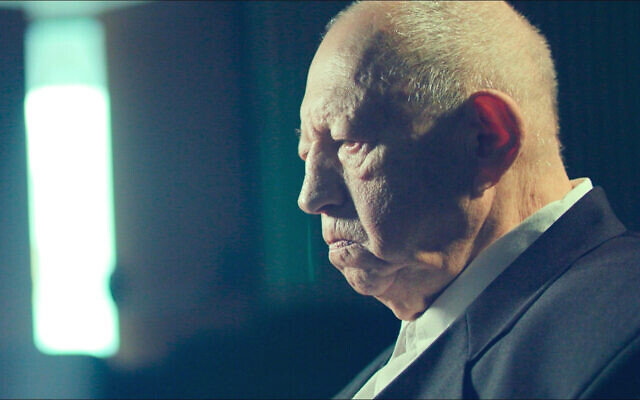
Leonid Berenshtein speaks to director Roman Shumunov in his eponymous film. (Courtesy)
“It was not a regular old project,” Shumunov said. “It was not like we had a big budget for shooting that could be edited. No, it was completely different. We did it in a different way.”
Filming took place in Ukraine, and Shumanov ended up with footage of “a lot of seasons,” he said. “We had snow, we had rain, we had summer, we had autumn… all of our characters passed the same four years during the shooting… like the real characters during the war.”
The final version features interviews with the real-life Berenshtein in his apartment in Kiryat Ata, as well as depictions of his wartime career, with actor Yaroslav Kucherenko playing the younger version of the protagonist. The elderly Berenshtein is shown with his caretaker and fellow Ukrainian native, Olga Proskyrenko. He reflects on a remarkable military career that began with the Battle of Kyiv in 1941 and culminated with his discovery of the V2 factory three years later, which had an impact beyond the war, as it was a key building block of the space programs of both the US and USSR.
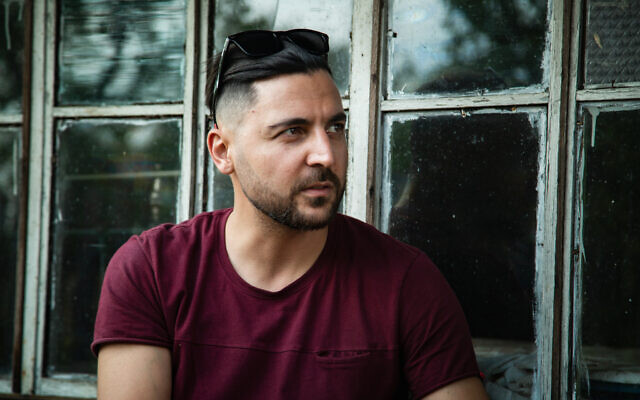
‘Berenshtein’ director Roman Shumunov. (courtesy)
Describing the V2 as the first ballistic rocket in the war, Shumunov said, “I think it was very important to find this rocket.”
In June 1944, British prime minister Winston Churchill wrote to Soviet premier Joseph Stalin urging Stalin to help the Allies locate the factory. The Third Reich had been bombing London with V2s.
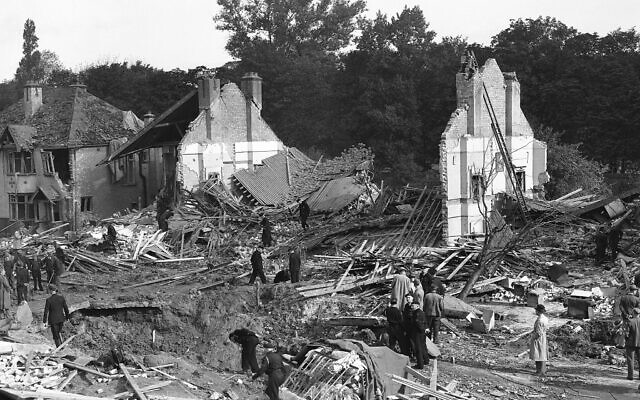
A view of the damage caused when a V2 rocket fell in Chiswick, London, on Nov. 11, 1944, killing three people and injuring a number of others. (AP Photo)
“The V2 rocket was very dangerous for the army,” Shumunov said. “It was something very new. No [other] country had this kind of weapon at the time. Actually, in fact, it could have switched the outcome of the war… This rocket was like the last hope of Hitler.”
This rocket was like the last hope of Hitler
He credited Berenshtein’s discovery as “something big, saving a lot of lives.”
At the outset of the war, Berenshtein hardly seemed destined for military leadership.
“It’s actually really strange,” Shumunov said. “He was a very weak young Jew in Kyiv… he grew up with his mother, only with his mother. His father died when he was like five years old.” But there was a source of strength, the director added: “His father asked him to help his mother and to be strong before he died.”
“He was telling me that when he was in bad situations, he always remembered his father’s words,” Shumunov reflected. “I don’t know what exactly switched him to be a leader… it was something inside him.”
Berenshtein joined the partisans under dangerous conditions. The Germans had captured Kyiv and were supported by collaborators. As a partisan, Berenshtein tried to keep his real name and faith a secret. His commander found out and accepted him anyway. Showing a knack for destroying German trains, his achievements accumulated, and he ultimately rose to a command of his own.
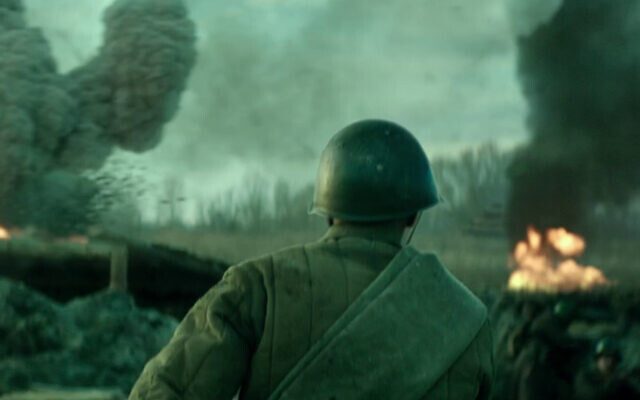
A still from Roman Shumunov’s docudrama ‘Berenshtein.’ (Courtesy)
“It was much more difficult to be in the partisans than to be in the regular army,” Shumunov said. “A lot of them had no rules. You had no time to go home, nothing. You just survived every single day… you were at the front, in the area of the enemy every time. You had no time to take a break, so it was very, very hard.”
In a fictionalized scene, Berenshtein must make an agonizing choice when the Germans fall upon a Ukrainian village. They burn it to the ground and massacre the inhabitants. He watches from a hilltop across the river with a fellow partisan named Marina — the sole fictional character in the film, described in the credits as “inspired by thousands of partisan women.” Marina wants to intervene and gets as far as the river before Berenshtein stops her. Although he is equally horrified by the atrocity, he believes they cannot intervene because it would risk retaliation against the partisans.
One scene shows Berenshtein’s intolerance of a real-life war crime by his own men. When the lieutenant of a unit raped and robbed a collaborationist schoolteacher, Berenshtein presided over the execution of four members of the unit, including the lieutenant.
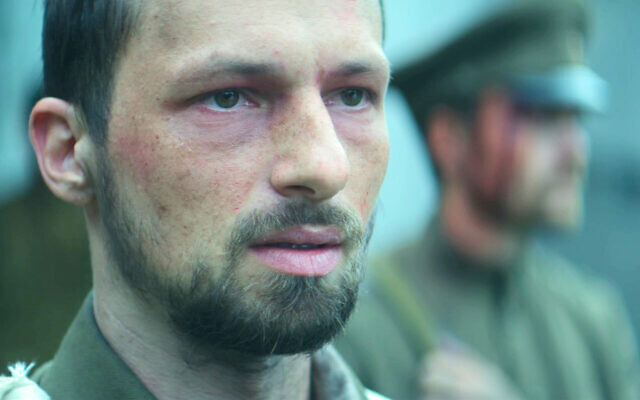
A still from Roman Shumunov’s docudrama ‘Berenshtein.’ (Courtesy)
“Looting or murder didn’t happen on my watch,” the elderly Berenshtein says in the film. “They didn’t. From then on, everyone knew I would execute them for it. They knew they mustn’t loot, mustn’t rape. We’re soldiers of the Red Army, and anyone who did that had to be held responsible for their actions.”
Later in the film, Berenshtein leads his partisans on a new mission. They board a plane at Slavuta Airport in western Ukraine. His team includes a wireless operator named Alexandra “Shura” Luneva, who ended up becoming his wife. Ironically, in the film she barely makes it to the plane in time.
Looting or murder didn’t happen on my watch. Everyone knew I would execute them for it
When the partisans land, they stumble upon an abandoned concentration camp in Poland. The camera focuses on Berenshtein’s reaction.
“We don’t see the bodies,” Shumunov said. “We don’t see the parts of bodies … we just see him, how he sees it… Our minds complete the image of what he’s seeing. Our minds are much better than any camera and any [special] effect.”
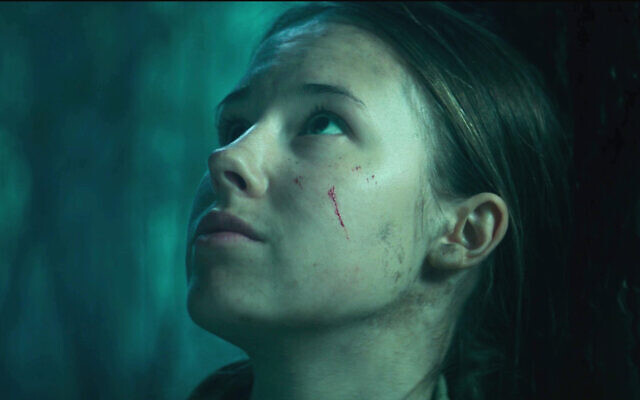
Viktoriya Levchenko as Shura in a still from Roman Shumunov’s docudrama ‘Berenshtein.’ (Courtesy)
After the war, in 1946, Berenshtein and Shura married. They had two children. He wrote multiple books about his wartime career. In 1993, the Berenshteins immigrated to Israel.
In his final years, Berenshtein made sometimes-critical comments about his treatment in Israel. “I never asked or will ask for help, but no one offered or was interested; that’s how I live,” he was quoted as saying in one media report. “I have been through a lot of medical committees and I am a certified injured war veteran without any benefits.”
Poignantly, Berenshtein died during the filming of his namesake movie, and his funeral is shown on camera.
Since the film’s release, its onsite locations in Ukraine, Bucha and Irpin, have become conflict zones again due to the Russian invasion of Ukraine.
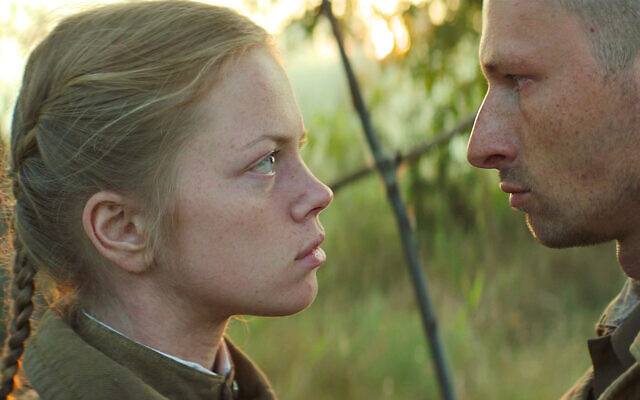
A still from Roman Shumunov’s docudrama ‘Berenshtein.’ (Courtesy)
“All of our crew was Ukrainian,” Shumunov noted. “They loved to make this story because it’s their history — a lot of partisans were in Ukraine, and they fought for their freedom and their honor, everything. But now this topic is very sensitive because of its connection to the Red Army, Russia and the Soviet Union.”
A lot of partisans were in Ukraine, and they fought for their freedom and their honor
The film has received praise from critics, winning two awards — best feature film and best director — at this year’s Montreal Israeli Film Festival. Meanwhile, Shumunov is keeping busy. In September, he launched “Munich ‘72,” a retrospective on the 50th anniversary of the Palestinian terror attacks at the 1972 Summer Olympics, with the involvement of Hollywood star Will Smith’s distribution company, Telepool.
Another of his recent projects includes directing the TV miniseries “Memory Forest,” a fictional account of Israeli teenagers visiting Holocaust sites in Poland.

Alex Silberg stars in ‘Memory Forest,’ directed by Roman Shumunov. (Courtesy)
Some may find it eyebrow-raising to see the occasionally bratty antics of the four main characters — high-schoolers Shani, Kobi, Liluch and Omri. On what is supposed to be a serious occasion, they find time to post on social media, drink in a hotel room, share munchies on a tour bus — and for Shani and Kobi, navigate romance. Yet they’re affected by what they see as much as anyone else, and they win sympathy and understanding from Rivka, the Holocaust survivor who joins their tour.
“I just wanted to show, in a realistic way, our connection to our past,” Shumunov said. “I wanted to bring historical stuff to a new generation.”
He added, “Everyone says [the characters are] the same, like us. This was the plan, to make it much more realistic, [as realistic] as possible, just to cut all the bullshit. Today, the new generation, they have no time, they’re much smarter than we thought. If you do it realistically… it’s going to work.”


